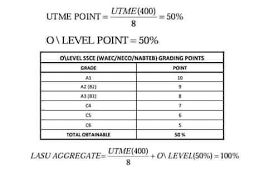Gaining admission into the Sule Lamido University (SLU) involves meeting the required cut-off mark set by the university and then calculating your aggregate score to determine your eligibility.
This post provides an overview of what an aggregate score is, how it is calculated, and why it is important for SLU admission.

What is Sule Lamido University?
Sule Lamido University (SLU) is a state-owned university located in Kafin Hausa, Jigawa State, Nigeria. Established in 2013 and licensed by the National Universities Commission, SLU commenced full academic activities in September 2014.
Overview of SLU Cut-Off Mark
After the UTME examinations, SLU sets a minimum cut-off mark that candidates must equal or exceed to qualify for the SLU post-UTME screening exercise. Typically, SLU’s cut-off mark ranges between 140-160.
What is Aggregate Score?
The aggregate score determines a candidate’s overall academic performance across relevant examinations. It is calculated as:
Aggregate Score = (UTME score + Post-UTME score) / Total mark obtainable
This score carries the most weight in SLU admission decisions.
Sule Lamido University (SLU) uses an aggregate score for admission decisions, combining weighted scores from key examinations:
- JAMB UTME
- SLU Post-UTME
- O’Level Exams
The aggregate score determines if you qualify to study your desired course. Calculation formulas differ slightly across departments.
This article provides a step-by-step guideline to calculate your aggregate score accurately.
Overview of Score Components
The major exam scores that make up your SLU aggregate score are:
| Exam | Typical Weight |
|---|---|
| JAMB UTME | 40-50% |
| SLU Post-UTME | 30-40% |
| O’Level Results | 20-30% |
How to Calculate Your Aggregate Score
- Obtain your scores for JAMB, Post-UTME, and O’Levels
- Find the department’s assigned weights for each exam type
- Multiply each score by the respective weights
- Sum the weighted scores to find your aggregate score
See the example calculation below for a sample Management Sciences candidate:
- JAMB Score = 250 (50% weight)
- Post-UTME Score = 70 (30% weight)
- O’Level = 75% (20% weight)
Then;
Aggregate Score = (JAMB score * JAMB weight) + (Post-UTME score * Post-UTME weight) + (O’Level score * O’Level weight)
Putting the values:
= (250 * 0.5) + (70 * 0.3) + (75 * 0.2)
= 125 + 21 + 15 = 161
So this candidate’s SLU aggregate score is 161.
I hope this breakdown clearly explains how to arrive at your department’s SLU aggregate score!
What is the cut off mark for Sule Lamido University?
The Sule Lamido University (SLU) management has set the JAMB cut off mark for admission into all courses during the 2024/2025 academic session at 140 and above.
Meeting this minimum UTME score makes you eligible to apply for the SLU post UTME screening, which is the next step towards gaining admission into the university.
SLU Cut Off Mark for All Courses
The cut-off mark set by SLU for all academic programs is 140.
Irrespective of your course of study at SLU, you must score 140 or above in UTME to be considered for admission.
| Faculty | Course | Cut-Off Mark |
|---|---|---|
| Faculty of Education | B.A. (Ed) English | 160 |
| Faculty of Education | B.A (Ed) History | 140 |
| Faculty of Education | B.A (Ed) Hausa | 150 |
| Faculty of Education | B.A (Ed) Islamic Studies | 150 |
| Faculty of Education | B.A (Ed) Arabic | 150 |
| Faculty of Education | B.A/B.Sc. Library and Information Science | 150 |
| Faculty of Education | B.Sc. (Ed) Biology | 170 |
| Faculty of Education | B. Sc. (Ed) Chemistry | 160 |
| Faculty of Education | B.Sc. (Ed) Mathematics | 140 |
| Faculty of Education | B.Sc. (Ed) Physics | 140 |
| Faculty of Education | B.Sc (Ed) Computer Science | 150 |
| Faculty of Humanities | B. A. Arabic | 160 |
| Faculty of Humanities | B. A. English | 160 |
| Faculty of Humanities | B. A. Hausa | 150 |
| Faculty of Humanities | B. A. History | 140 |
| Faculty of Humanities | B.A. Islamic Studies | 180 |
| Faculty of Natural and Applied Sciences | B. Sc. Biology | 170 |
| Faculty of Natural and Applied Sciences | B. Sc. Chemistry | 160 |
| Faculty of Natural and Applied Sciences | B.Sc. Computer Science | 170 |
| Faculty of Natural and Applied Sciences | B. Sc. Mathematics | 140 |
| Faculty of Natural and Applied Sciences | B. Sc. Physics | 140 |
| Faculty of Social and Management Sciences | B.Sc Accounting | 160 |
| Faculty of Social and Management Sciences | B.Sc Business Management | 160 |
| Faculty of Social and Management Sciences | B.Sc Economics | 180 |
| Faculty of Social and Management Sciences | B.Sc Geography | 160 |
| Faculty of Social and Management Sciences | B.Sc Sociology | 160 |
Please note that the table includes the Faculty, Course, and Cut-Off Mark columns for clarity.
Post UTME Application Guidelines
To apply for SLU’s post UTME, you must have:
- Minimum UTME score of 140
- 5 O’level credits – English, Maths, Chemistry, Physics, Biology
- Meet subject combinations for your program
Check the SLU portal for details on post UTME application, test dates,SLU fees, venues, and other guidelines.
SLU Admission Requirements
Here are the general admission requirements into SLU for UTME (100 level) and direct entry (200 level) candidates:
100 Level Requirements
- Minimum UTME score (140)
- O’level credits in relevant subjects
- Acceptable post UTME score
Direct Entry Requirements
- Related diploma or NCE
- Minimum of lower credit
- UTME admission process
- O’level credits in English & Maths
Meeting the outlined requirements makes candidates eligible to study their desired programme at SLU.
I hope this guide provides useful insights into the SLU cut off mark, post UTME process and admission requirements.



